- Home
- Lauren Willig
The Ashford Affair Page 14
The Ashford Affair Read online
Page 14
“One cup of tea at a time?” he said derisively.
She looked at him in dismay. He was mocking her, she realized. Put that way, her job at The Bloomsbury Review did seem remarkably silly, as silly as working for a fashion house or a gossip column. Shame made her cheeks heat. So much for flirtation or sophistication. She’d made an utter fool of herself, and all for what? The memory of a mouse?
She held out a hand with all the dignity she could muster. “Thank you for seeing me home, Captain Desborough. It was very good of you. I do hope I did not incommode you too greatly.”
It was a horrible, stilted little speech.
Captain Desborough didn’t take her hand. He stood, looking down at her, his lips pressed tightly together. “No, it wasn’t good of me,” he said baldly. “That was beastly of me. And entirely uncalled for.”
Addie shrugged uncomfortably. “You were only being honest. It is rather silly when you look at it that. To be so proud of getting to make the tea…”
“Don’t forget the old saw about oaks and acorns. All great things come from small beginnings—and poetry from a pot of tea.” Captain Desborough tilted her hat back until he could see her face. “I didn’t mean to belittle your new venture. Forgive me?”
She blinked up at him, afraid to move, to break the spell. “There’s nothing to forgive,” she said breathlessly.
His eyes were very, very green in his pale face, like jade, ancient and earnest. He was still standing too close, close enough that her skirt brushed against his trousers, close enough that Addie could practically hear the kitchen maids whispering about it through the railings.
“Look,” he said. “I feel like the worst sort of cad. Let me make it up to you?”
“There’s no need,” said Addie, feeling suddenly shy again. She stepped back, her skirt whispering against the iron railings. “There’s nothing to make up.”
Captain Desborough’s gaunt face lit with a sudden smile. “But I want to,” he said. “And I want to hear more about your excursion into bohemia. Can I stand you supper?”
London, 1999
Clemmie ate supper at Rivesdale House.
It was only seven o’clock London time, still early for dining, as the almost empty dining room attested. Right now, Clemmie didn’t care about being fashionable; she was just glad she was still awake. They’d had a full day of meetings, going from Dorchester House to co-counsel’s office on Silk Street to the PharmaNet offices in trendy Docklands. Clemmie didn’t like to think how long she’d been wearing the same clothes.
She had to hand it to Brooks Brothers; their non-iron shirts really did hold up well. Especially after—she did the mental math—twenty-seven hours of continuous use. Weird to think that she’d put it on yesterday morning in her own apartment and hadn’t changed since. Yesterday felt like a million years ago. International travel did strange things to both one’s sense of time and one’s billable hours. Paul liked to brag that he frequently billed more than twenty-four hours in a day, with a little help from the Concorde.
“Not exactly the firm cafeteria, huh?” whispered Harold, the junior associate.
“Huh?” said Clemmie. “Sorry. What did you say?”
Harold poked her in the arm. “This. Pretty impressive.”
There was no arguing with that. The walls were hung in a rich mulberry brocade, although it was hard to see the fabric beneath the paintings, row upon row of them, hanging from cords from the moldings. There wasn’t much of a theme to them. It looked like someone’s ancestors had gone on a rummage in Rome circa 1700 and picked up whatever was going cheap: battle scenes, biblical scenes, landscapes, portraits of smirking courtiers. There were the requisite dead fowl and large bowls of fruits and spaniels with liquid brown eyes, as well as a brawny woman holding someone’s head suspended over a silver platter.
There were two fireplaces, one on either side of the room, bracketed by recessed pillars that looked, to Clemmie’s untrained eye, like real marble, rather than its painted imitation. Large portraits hung above each, one of a woman in the tight-waisted garb of the late nineteenth century, the other in one of the waistless creations of the twenties. They appeared to be glowering at each other across the room, locked in a timeless generational battle. Even preserved in paint, Edwardian Woman didn’t approve of Flapper Girl.
What was it the magazine cover had called the place? A country house hotel in London? Yup, she could see that. The menu bore that out. Printed on a single sheet of heavy card stock, deeply embossed, it boasted mostly fowl in various forms: partridge, grouse, pheasant. For the pescatarians, there was a fish option: wild Scottish salmon. For the price, it ought to come dressed in a kilt and dancing a reel.
“Perhaps a nice Château Lafite,” murmured Paul, who was perusing the wine list with an attention he seldom applied to client documents. “Or a white Bordeaux.”
Clemmie leaned back in her chair, letting her eyes roam around the room. Only two of the other tables were tenanted. There was a young couple, looking bored, by the far wall—honeymooners, maybe? At the far end of the room, beneath Flapper Girl, two elderly ladies were carrying on an animated conversation over their wild Scottish salmon.
“She looks kind of like you,” said Harold.
“Who?” If he meant one of the octogenarians, she was going to be seriously offended.
“The woman in the painting.” He nodded at the picture of the Flapper Girl.
“It’s just the hair,” said Clemmie dismissively, but she gave the portrait a second look all the same.
The portrait was slightly blurry, either from accumulated candle smoke or by design Clemmie couldn’t tell. It gave the woman a slightly dream-like look, her eyes smudged and sultry. She sat on a bench, one thin hand resting on the velvet cushion, as if she had just sat down or were about to get up again. There were pearls looped around her neck, strands and strands of them, and more at her ears and wrists. A black band circled her pale hair, lending her a somehow rakish air. Or maybe that came from the cock of her hip, the quirk of her lips. There was a decidedly come-hither air about her, but it was more of a challenge than an invitation.
She looked, thought Clemmie, as though she ate men up and spat them out again.
There was something strangely familiar about her. Not the expression, but the facial features. Clemmie knew she had seen her before, but in a different setting, with a different tone. She grasped after the memory.
Paul drew in his breath in a long hiss. “You know who that is, don’t you?”
“Bea,” said Clemmie, realizing suddenly where she had seen her before. It was the woman in Granny Addie’s drawer.
Paul looked at her as though she were stupid. “What? That’s the owner,” said Paul impatiently in a whisper that wasn’t. “The Marquess of Rivesdale.”
“Huh?” Clemmie came down with a crash from her own thoughts. “Where?”
“There.” Paul nodded to the far side of the room, where a man had paused to say hello to the two elderly ladies, bending to kiss one of them on the cheek. He had changed out of his gray flannels and into the regulation black and white of evening wear, but Clemmie recognized him as the man at the desk.
“Seriously? I thought he was the desk clerk. He was very sweet about getting me a cab this morning,” she added as Paul’s eyes bugged out in horror.
As if he knew they were talking about him, the marquess looked up, saw her, and smiled. Catching sight of Paul, he just as quickly turned away again. He didn’t, thought Clemmie, look terribly marquess-like, or at least not what she would have imagined a marquess would look like. He looked like a junior professor or someone’s cousin at a wedding, the one whom you didn’t mind getting seated next to.
Paul looked a bit like the time he had accidentally swallowed that cocktail olive at a post-trial party. “You made him get you a cab?”
“He offered.”
Paul raised a hand. “Marquess!”
The marquess slowly disengaged himself from his elderly
admirers. “Mr. Dietrich,” he said politely. Then he turned to Clemmie. “I see you found your party.”
“My colleagues,” corrected Clemmie. Just in case he thought she was hanging out with Paul for fun. “Thanks for the cab this morning. You were a lifesaver.”
“It was my pleasure,” he said gravely, as though he lived to hail conveyances for pesky American businesspeople—which, if he was running a hotel, he probably did. “I hope you enjoy your stay at Rivesdale House.”
“I’d enjoy it more if you’d have some extra towels sent up,” said Paul.
“Certainly,” said the marquess. Clemmie gave him points for not going after Paul with the wine list. “I’ll see that it’s done. Good evening.” His polite nod expertly encompassed them all.
“Excuse me.” Clemmie’s voice caught the marquess mid-step. “Excuse me, er—” What did one call a marquess? Your Lordship? My lord? Jon would know.
He turned, slowly. “Yes?”
He probably thought she was going to ask him for more towels. Clemmie shoved the menu out of her way, planting her elbows on the table. “The woman in the picture? Was her name Bea—I mean, Beatrice?”
“What?” said Paul.
The marquess blinked at her.
Clemmie waved her hands in the air. “Forget I asked. Silly question. It’s just … Never mind.”
“No,” The marquess cleared his throat, shaking back his shock of brown hair. “Not at all. It’s not a silly question. She was born Lady Beatrice Gillecote.” He pronounced it the way Granny had, making the G hard and the vowels flat. “Are you a student of the period? We do get many Americans with an interest in our history…”
Ha. She could hear Jon hooting with laughter at the very suggestion. Her knowledge of history was limited to Mel Brooks’ History of the World: Part I, with a side of Ken Follett. She didn’t even watch BBC costume dramas.
“Not really. It’s just that she’s a—well, a sort of cousin. She was my grandmother’s first cousin.”
“That makes us cousins then, too. Of a sort,” he corrected himself. He added, almost apologetically, “Lady Beatrice was my grandfather’s first wife.”
“So there’s no real relationship,” said the practical-minded Harold.
“Do we get the family discount?” cracked Paul.
The marquess’ smile went a bit stiff around the edges. “It’s a fairly distant connection. Lady Beatrice was the first wife of the fifth marquess.”
It sounded like an LSAT logic problem. If the first wife of the fifth marquess was going fifty miles an hour and the second wife of the fourth marquess was going sixty miles an hour, whose tiara would fall off first?
“Did she live here?” Clemmie asked tentatively.
It was hard to imagine Rivesdale House as a private home, much less as a private home in which her grandmother might have been a guest. In Clemmie’s world, such places existed only as hotels or as museums. She wondered if Granny had come to tea here, if she’d exchanged confidences with her cousin in the bedrooms upstairs or stood back to admire or comment on the location of the new portrait of her cousin as the workmen hoisted it onto the dining room wall.
“Lady Beatrice did live here,” the marquess said, sounding more reserved than the question warranted. “For a time.”
“For a time?” Clemmie echoed.
The marquess glanced back at the portrait, preserved in eternal chic. “They were only married two years.”
TEN
London, 1920
“Were you going to tell me you were off?” asked Bea sweetly. “Or were you just planning to go?”
“Dash it!” Marcus blundered into a pedestal holding a high Chinese vase, catching it just before it toppled.
Leaning back against the doorframe, Bea watched him coolly as he grappled with it. She had caught him in his country tweeds, hand on the knob of the dressing door, preparing to slip away for yet another Saturday to Monday without her.
“Oh, dear,” she said with false concern. “Did I startle you?”
Giving the vase a final pat, he flashed her a strained smile. “Er, just a bit.”
Bea didn’t say anything. She just waited, idly flicking the ash from her Turkish cigarette. The thin line of smoke created a hazy trail between them.
In the beginning, he used to ask her before he went away. Just a brief jaunt with a few friends for the shooting, she didn’t mind, did she? After awhile, the asking had turned into an announcement and, from announcement, nothing at all. She wouldn’t have known Marcus was leaving if she hadn’t seen his valet, earlier, packing up his shaving kit, the special one with his initials in silver that she had had commissioned for him in Paris on the occasion of their one-month anniversary.
It baffled her that she had been reduced to this, spying on servants, stalking her husband’s movements, snatching his correspondence off the tray in the hall.
“I didn’t see you there,” he added.
“No,” said Bea acidly. She took a long drag on her onyx cigarette holder, the one Marcus had bought her in Paris, with her initials inlaid in diamonds. “You wouldn’t, would you?”
She couldn’t remember the last time he had looked at her instead of through her or around her. She was as much of a fixture as that blasted vase on its stand, something to be navigated around, something to be steadied before it smashed.
Bea wondered what he would do if she took the vase in both hands and flung it down, flung it down onto the floor so that it smashed into a thousand tiny shards at their feet.
It wouldn’t, though. The carpet would cushion the fall, muffling the sound, and the servants would sweep up the pieces. And Marcus would go blithely on.
“Having a pleasant afternoon?” Marcus ventured, doing his best to brazen it out. “Lovely weather we’re having, what?”
The weather? That was the best he could do? The weather? But, then, thought Bea, grinding ash into the Axminster carpet, he never had been much of a conversationalist, not even in the halcyon heyday of their courtship when his eyes, his thoughts, his roving hands had been only for her, when he had followed her, fascinated, from ballroom to balcony.
She had told herself that it didn’t matter, that what he didn’t say was as important as what he did. So what if he couldn’t woo her with poetry? He was a man of action, not a man of words, and he hadn’t been the least bit chary about indulging his impulses.
She had never stopped to consider what might occur should those impulses lead him somewhere else. Her husband stray from her? The idea was laughable.
Until it wasn’t.
Bea took a long drag at the tip of her onyx cigarette holder, leaning lazily against the doorframe. “Who is it this weekend? The luscious ffoulkes sisters?”
“Lavinia and Bunny will be joining the party, yes. Among others,” he added hastily.
Bea raised a carefully manicured brow. “You mean Stuart Trevis and Dick Penhallow and that tiresome Curzon girl with the nasal voice?”
“Yes,” said Marcus defensively. “They will be in attendance.”
“Of course they will,” murmured Bea. “Your precious Gang.”
And wasn’t it just too too? They called themselves something absurdly twee, the Gorgeous Gang or the Gruesome Gang or the something equally sick making, even worse than Diana Manners and her Corrupt Coterie. Stuart had been best man at Marcus’ wedding. Dick—or Deadly Dull Dick, as Bea had dubbed him—was a ffoulkes cousin, firmly in the enemy camp. His presence lent a spurious pall of respectability to Lavinia’s painfully obvious attempts to snag Bea’s husband.
The Gang hadn’t been in existence in the golden days of their courtship. Then, it had been all laughter and champagne. Their engagement had been a whirlwind of fast motor rides, breathless embraces in gardens, sneaking off to dance at Rector’s, where there was a jazz band who wore fireman’s helmets, and dizzy-making drinks in thick, cheap cups. It would wear off eventually, Bea knew. At some point when they were old and stodgy with three children in the
nursery, when her waist had thickened and Marcus’ looks had gone. But not now, not while she was still beautiful and admired, not while men still threatened, half-jokingly, to take their own lives if she wouldn’t throw Marcus over and take them instead. She was the Debutante of the Decade and Marcus was puffed with pride at having won her.
As for Lavinia, she was a thing of fun, she and Deadly Dull Dick. Passing a hidden flask back and forth under the cover of a potted palm, Marcus and Bea had mocked them, stodgy, managing old Lavinia and slack-lipped Dick, their witticisms becoming wittier with each swig of cherry brandy or whatever vile concoction of the moment.
Paris had been even better, no chaperones, no disapproving dowagers. Bea’s adoring husband had given her carte blanche to indulge her fancies in the newly reopened shops of the Paris couturiers. He had taken her to the Folies Bergeres, let her experiment with absinthe, gone with her on the rounds of the nightclubs of Paris. They had found friends, Old Etonians posted to Paris, young couples on holiday, roving the restaurants and clubs in a great, laughing gang, making up laughing groups for cards or picnics. And each night, she and Marcus would tumble into bed in their room at the Ritz, making the bed rumble and creak. She had laughed at him for his enthusiasm. Like a puppy, she had told him, and he had pounced, just because, making her laugh and squeal and squirm.
And then the cable had arrived, and it was all over before it had begun.
She wanted it back, she wanted it all back, she wanted the laughter and the admiration and the squealing. But, somehow, between mourning and bed rest, she had lost it all; she had been supplanted by the Gang. By the Gang and by Bunny.
It would almost be funny if it weren’t so awful. There was Lavinia, organizing impromptu picnics, theatre tickets, punting parties, weekends at Haddleston, so triumphant at finally having snagged the man she’d lost, never once realizing that the real threat wasn’t Bea but her own little sister. Bunny hadn’t had to delay her debut; she was just out, right on schedule, eighteen and untouched—and as scheming as they came.

 That Summer
That Summer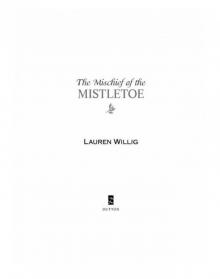 The Mischief of the Mistletoe
The Mischief of the Mistletoe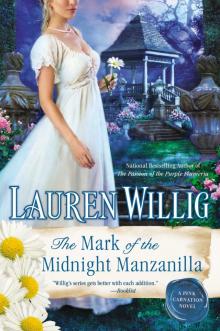 The Mark of the Midnight Manzanilla
The Mark of the Midnight Manzanilla The Other Daughter
The Other Daughter The Ashford Affair
The Ashford Affair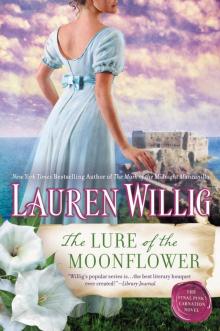 The Lure of the Moonflower
The Lure of the Moonflower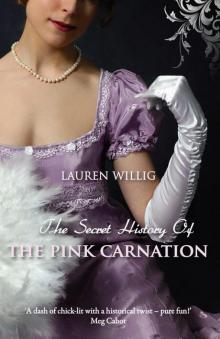 The Secret History of the Pink Carnation
The Secret History of the Pink Carnation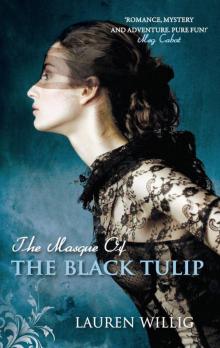 The Masque of the Black Tulip
The Masque of the Black Tulip The Passion of the Purple Plumeria
The Passion of the Purple Plumeria The English Wife
The English Wife The Garden Intrigue
The Garden Intrigue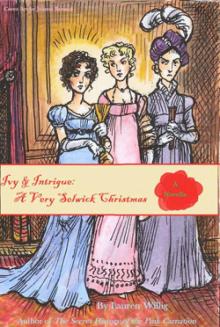 Ivy and Intrigue: A Very Selwick Christmas
Ivy and Intrigue: A Very Selwick Christmas The Orchid Affair
The Orchid Affair The Summer Country
The Summer Country The Betrayal of the Blood Lily
The Betrayal of the Blood Lily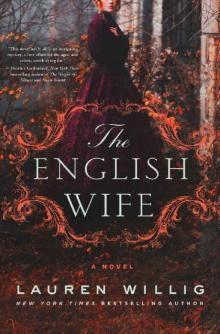 The English Wife: A Novel
The English Wife: A Novel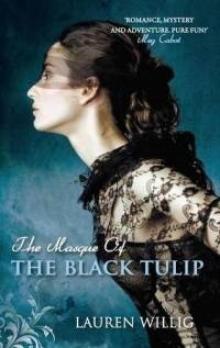 Masque of the Black Tulip pc-2
Masque of the Black Tulip pc-2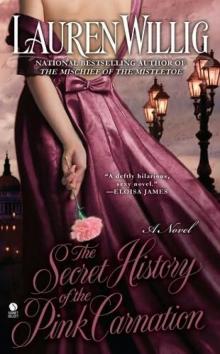 The Secret History of the Pink Carnation pc-1
The Secret History of the Pink Carnation pc-1 That Summer: A Novel
That Summer: A Novel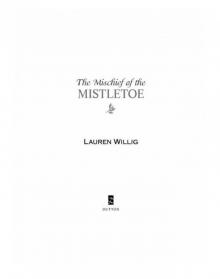 The Mischief of the Mistletoe: A Pink Carnation Christmas
The Mischief of the Mistletoe: A Pink Carnation Christmas